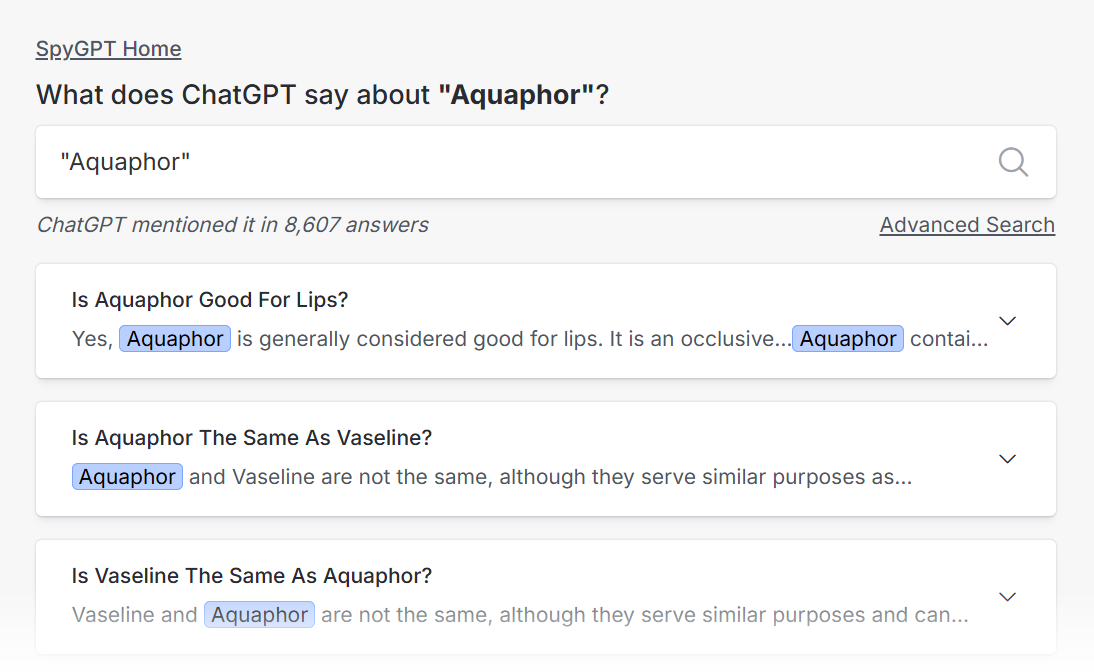What if we could do the same thing for brands in AI that we did with Google SERPs?
Almost 20 years ago, reverse searching Google SERPs was a novel idea. We know, because we kicked it off. When SpyFu started, it let you find all of the keywords that people used to find your competitors--and your business--on Google. SEOs could reach previously-hidden intel, so it was a game changing advantage to learn where you showed up and where you were missing out compared to your competition. Now, we're delivering again--this time for AI mentions.
We asked ChatGPT 250 million questions so you could learn what it's saying about you.
What do people want to know about you? What do people ask where you're in the response? Or maybe--and this is an eye-opener--what are they asking where your competitor edges you out as the top answer?

AI searches are skyrocketing, and you can't ignore the opportunities to get your name in the answers. This tool helps you find those gaps more easily. If AI pulls your competitor into the answer over you, that is a clear place to start.
How is this different from asking ChatGPT directly?
When you go to ChatGPT directly, the questions you ask are whatever you can brainstorm. But if you search SpyGPT, you will discover questions that people ask that might have never hit your radar.
Today, it's easy to take SEO keyword research for granted. You research the terms that your potential customers are using, and you optimize your pages so they show up prominently on the SERP. Years ago that reasoning wasn't so obvious, and today keyword research is an essential part of any SEO team's workflow. We're helping you get ahead of the curve the same way with AI optimization.
Find the gaps in AI mentions between you and your competitors, and close them.
Use Search Operators for More Direct Answers
SpyGPT lets you search through millions of responses that ChatGPT gives to the most frequently asked questions. Find out what it says about you relative to your competitors.
Basic search operators make that a clean, easy search. With + and - available in combination with your name and your competitor(s), you can try searches like:

The combination of one or two competitors minus your brand tells you “which questions your competitors are being promoted in and you aren’t”. Once you know that, you can optimize for those very questions.
Remove Branded Questions
Some searches will surface questions that include the brand name. For example, when I search Windex, I see questions asking specifically about the window cleaner. Does Windex have ammonia? Can you use Windex on a computer screen? Is Windex a disinfectant?

However, there's a benefit to learning the questions that aren't about Windex, but ChatGPT still promotes them in the answer.
With your brand, you know that you will appear in questions about yourself. But how many open-ended questions end up mentioning your brand?
To get there, use a search operator that keeps the brand but removes it from the question:
+brand -question:brand (Replace your name where it says brand.)
Notice the new results.

Optimize for AI Mentions
I found opportunities, now what?
Optimize your web pages for AI mentions. If you're worried that you don't have a clear handle on this, you're in the same boat with plenty of pros.
We know that, for now, it generally follows good SEO. However, there's one big difference that adds a twist.
AI mentions about your brand also come from other pages outside of your own. As a brand, be sure to answer those targeted questions outside of your website, too. This could be in YouTube videos, Reddit conversations, and social media channels. More connections with a wider reach will help you close those gaps where you are not mentioned.
AI mentions about your brand also come from other pages outside of your own.
Don't Just Spam and Go
Creating valuable, shareable content, engaging in social media, and collaborating with influencers or thought leaders can all enhance your visibility. This broad content approach ensures that when users ask questions relevant to your expertise, you're more likely to have a voice in ChatGPT responses.
Go a little deeper: find where people in your niche are discussing ideas--a specific Reddit channel, or in Quora? Explore to see what areas get the most traction. That can help you narrow down where to publish or contribute, because when AI gathers information, you want to be among trusted sources in important conversations.
Keep Aiming for Strong SEO
Don't change your SEO practices. They create the right foundation for landing AI mentions.
Be helpful: Answer questions that people want to know, but go deep. Offer thorough explanations in relatable terms. This doesn't mean adding an FAQ to your page. Elaborate on an answer in long form, because you are more likely to include additional context for AI to learn from.
Write clearly: ChatGPT and Google's AI Overview have been sharing concise clips to give the searcher a heaping spoonful of information without overloading the response. You should package your answers similarly. Get to the point. Use direct, short statements along with your longer descriptions.
Add authority: You have ideas to share and opinions to build on. Use your expertise to help your audience feel more confident about your stance. Audience trust is what makes you more shareable and link-worthy.
Build links: You should be building connections via internal links and external links with other sites, improving the chances of your content being found. It also builds credibility with AI models and signals you as a reliable source of information.
AI algorithms are designed to deliver answers that feel authoritative and contextually relevant. This means your brand’s presence and contributions need to reach multiple touchpoints.
A Combination Approach: Short and Long Term
Closing your gaps in AI mentions will no doubt be a multi-pronged plan. We also expect to see this evolve quickly over the next few years. For now, we're confident in this approach.
In the short term, closing your content gaps against your competitors will help you with your SEO. Healthy SEO leads to a healthy AI presence. Adding fully-fleshed out, supporting ideas to your content will help it grow more helpful and authoritative. SpyFu and RivalFlow AI help to solve that.
SpyFu identifies important pages that bring your competitors more traffic--their areas of authority and expertise. Challenge them with your own ideas and content. Further, you can use SpyFu Kombat to dig into essential keywords that your competitors rank for, but you don't.
RivalFlow AI finds pages that outrank your page and analyzes what you can go to surpass them instead. It focuses on questions that you don't answer. Sound familiar? It springs from the same sound advice we offered about optimizing for AI. By comparing your higher-ranking competitors, RivalFlow finds subtopics that you need to cover better if you're going to earn a higher spot on the SERP. It also writes new text to add to your page so you can improve your existing content.
That leads us to the long term approach. Closing those content gaps will also help get you mentioned more often as AI models learn that you're a reliable suggestion.
Closing your content gaps will help get ChatGPT (and other LLMs) to promote your product. Answering questions in your content will lead to more AI mentions in the future.

